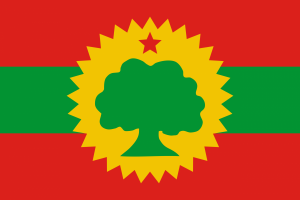Language/Borana-arsi-guji-oromo/Grammar/How-to-Use-Have
Hi Borana-Arsi-Guji Oromo learners! 😊
In this lesson, we will learn how to use "have" in our language. This is an important part of our grammar, and we will go over all the different ways you can use "have". By the end of this lesson, you will be able to use "have" fluently and correctly in a variety of situations. So let's get started!
Consider exploring these related pages after completing this lesson: Pronouns & Questions.
Introduction to "Have"[edit | edit source]
"Have" is a verb that we use to indicate possession or ownership. In Borana-Arsi-Guji Oromo, we have a few different ways to express possession with "have". We can use different forms of the verb "to have" depending on who has the possession and how many possessions there are.
In English, we might say "I have a book" or "She has a pencil". In Borana-Arsi-Guji Oromo, we have different words that we use depending on whether the possession is singular or plural. We also have different words for "I have", "you have", "he/she has", and "we have".
Let's start with the most basic way to express possession:
"Have" for Singular Possession[edit | edit source]
When we want to say that we have one thing, we use the word "too" in Borana-Arsi-Guji Oromo. This is the equivalent of saying "have" in English. Here are a few examples:
| Borana-Arsi-Guji Oromo | Pronunciation | English |
|---|---|---|
| toowwaa | /to̞owːa:/ | I have |
| tooyyoo | /to̞oj:o/ | You have |
| tooftaa | /to̞ofta:/ | He/She has |
Let's use these words in a dialogue:
- Person 1: Toowwaa kitaaba qabdi. (/to̞owːa: kɪtäːbä: qabdi/) (I have a book.)
- Person 2: Tooyyoo qalamii qoodi. (/to̞oj:o qalämiː: jo:di/) (You have a pen.)
- Person 1: Tooftaa honiifi bishaanii qabdi. (/to̞ofta: hʊni:fi biˈʃa:ni: qabdi/) (He/She has a phone.)
"Have" for Plural Possession[edit | edit source]
When we want to say that we have more than one thing, we use the word "eessaa" in Borana-Arsi-Guji Oromo. This is the equivalent of saying "have" in English for plural possessions. Here are a few examples:
| Borana-Arsi-Guji Oromo | Pronunciation | English |
|---|---|---|
| eessaan | /e̞ːsa:n/ | We have |
| eessaatti | /e̞ːsati/ | You all have |
| eessaatu | /e̞ːsatu/ | They have |
Let's use these words in a dialogue:
- Person 1: Eessaan buchootti naannoo qabdi. (/e̞ːsa:n bütʃötti naːnno: qabdi/) (We have two cows.)
- Person 2: Eessaatti erra tamsaasa tokko qabdi? (/e̞ːsati erːa tämsa:sa toko qabdi/) (Do you all have three books?)
- Person 1: Eessaatu arkiifi jibbaa fedhe qabdu. (/e̞ːsatu ärrkii fi jɪbba: fedhe qabdu/) (They have shoes and bags.)
"Have" in the Past Tense[edit | edit source]
In English, we might say "I had" or "She had" to indicate that we had something in the past. In Borana-Arsi-Guji Oromo, we use a different tense to talk about past possession. We use the word "haadhoo" in the past tense to indicate that we had something in the past.
Here are a few examples:
| Borana-Arsi-Guji Oromo | Pronunciation | English |
|---|---|---|
| haadhoo | /haːðo̞:/ | I had |
| haadii | /haːdi:/ | You had |
| haaditti | /haːditti/ | She had |
Let's use these words in a dialogue:
- Person 1: Haadhoo kitaaba qabdi. (/haːðo̞: kɪtäːbä: qabdi/) (I had a book.)
- Person 2: Haadii qalamii qoodi. (/haːdi: qalämiː: jo:di/) (You had a pen.)
- Person 1: Haaditti honnan taloo qabdi. (/haːditːi hʊ̈nna lɑ:o qabdi/) (She had a flower.)
"Have" in the Negative Form[edit | edit source]
When we want to say that we don't have something, we use the word "teessi" in Borana-Arsi-Guji Oromo. This is equivalent to saying "don't have" or "doesn't have" in English. Here are a few examples:
| Borana-Arsi-Guji Oromo | Pronunciation | English |
|---|---|---|
| teessiinni | /te̞ːsiːɲɲi:/ | I don't have |
| teessiitti | /te̞ːsitti/ | You don't have |
| teessiijjaa | /te̞ːsiːdʒa:/ | He/She doesn't have |
Let's use these words in a dialogue:
- Person 1: Teessiinni kitabaan teenya qabdu. (/te̞ːsiːɲɲi kɪtäːbä:n tɛːɲa qabdu/) (I don't have a new book.)
- Person 2: Teessiitti qalamii tokko qabdi. (/te̞ːsiːti qalämiː toko qabdi/) (You don't have a pen.)
- Person 1: Teessiijjaa honnan jaalala qabdu. (/te̞ːsiːdʒa: hʊ̈nnen jaːlala qabdu/) (He/She doesn't have a friend.)
Conclusion[edit | edit source]
Congratulations! You have now learned how to use "have" in Borana-Arsi-Guji Oromo! This is an important part of our grammar, and we hope you will be able to use it fluently and correctly. To further improve your Borana-Arsi-Guji Oromo Grammar, you can also use the Polyglot Club website. Find native speakers and ask them any questions!
➡ If you have any questions, please ask them in the comments section below.
➡ Feel free to edit this wiki page if you think it can be improved. 😎
Having concluded this lesson, consider checking out these related pages: Give your Opinion & Negation.

